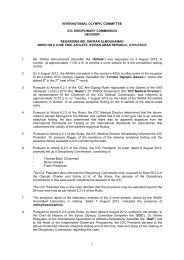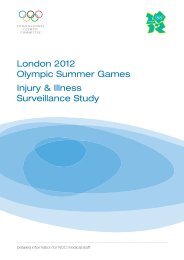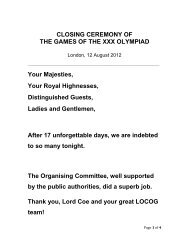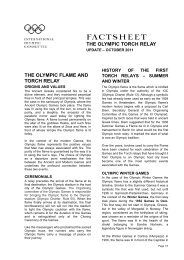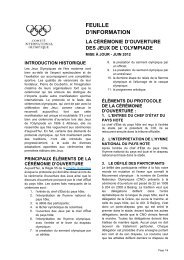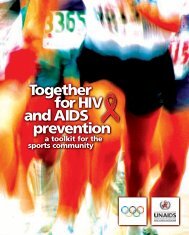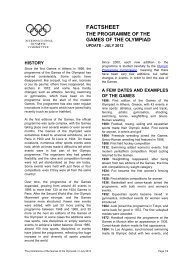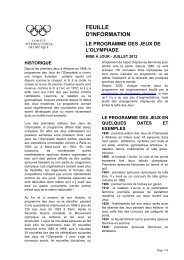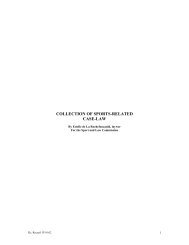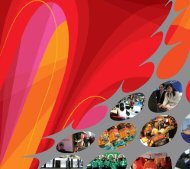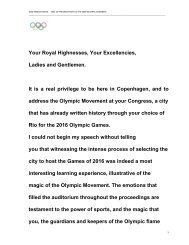8th WORLD CONFERENCE ON SPORT AND THE ENVIRONMENT
8th WORLD CONFERENCE ON SPORT AND THE ENVIRONMENT
8th WORLD CONFERENCE ON SPORT AND THE ENVIRONMENT
Create successful ePaper yourself
Turn your PDF publications into a flip-book with our unique Google optimized e-Paper software.
<strong>8th</strong> World Conference on Sport and the Environment<br />
International Cooperation and Development Department<br />
Announcement of winners of VANOC’S digital storytelling contest:<br />
”u-reduce, u-produce”<br />
Report<br />
Presentation was made of the winning entries from VANOC’s digital storytelling contest called<br />
“u-reduce, u-produce”, for British Columbia Youth. There were 20 entries and young people had<br />
been asked to provide clips for inventive ways to reduce their environmental impact. The jury had<br />
been impressed by the entries.<br />
Olympian and IOC member Frankie Fredericks introduced the Grand Prize winners, a video rap<br />
song called “Stop Hurting Our Planet”. He stated that the IOC was listening to the presenters and<br />
their concerns. That’s why the Youth Olympic Games had been created and he and others would<br />
be there as role models. Mr Fredericks stated that running had got him out of the slums—this<br />
showed the impact of sport in inspiring young people.<br />
4.12. Sport Organizations: Shaping Sport and Driving<br />
a More Sustainable Future<br />
Mr Andres Botero-Phillipsbourne,<br />
IOC Member and IOC Sport and Environment Commission, Colombia<br />
Mr Botero-Phillipsbourne delivered a comprehensive analysis of how Colombia has utilised large<br />
sporting events and their related coordinating bodies to change attitudes regarding environmental<br />
sustainability. Given the opportunity to host the South American Games in 2006, the city of Medellin,<br />
Colombia began to integrate sport development and greener environmental programme. In the<br />
lead-up to the Games, Medellin instituted a plethora of environmental sustainability measures<br />
from more bicycle lanes to a prohibition on two-cycle motorcycles, which are a signifi cant<br />
contributor to emissions. The greatest technological change, and one which was a fi rst for a<br />
major sporting event, was to construct the Games Village around a substantial cable car system<br />
to allow easy transport of athletes and spectators, creating limited intra-city transport emissions.<br />
Mr Botero-Phillipsbourne used Medellin as an example of how sports events can be used to<br />
address sustainable development and closed his speech by prompting the IOC to address the<br />
current ecological crisis in the Amazon Rainforest.<br />
Ms Judith Conrad,<br />
Head of Department of Ethics & Development,<br />
National Olympic Committee, Switzerland<br />
Ms Conrad outlined measures that the Swiss Olympic Committee has undertaken to promote<br />
sustainability within Swiss national sports organisations. The emphasis of the discussion was<br />
on the “ethics” of sport and how the term ethics can transcend traditional conceptions and<br />
incorporate environmental practices. The essence of the Swiss strategy was to “foster sport” and<br />
Page 46 / 80





